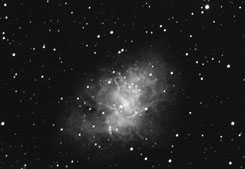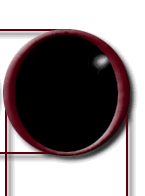"Crab
Nebula -- M1" 11/11/99 Kitt Peak, Arizona
(Image by Adam Block, Willis Greiner and Cheryl
Price. Copyright NOAO, all rights reserved.)

This
CCD image was obtained using a 16" Meade Schmidt-Cassegrain
telescope operating at f/6.3. The camera used was a SBIG ST-8;
sky chart software was Software Bisque's The Sky, acquisition
and image manipulation software was Cyanogen's Maxim DL. Three
300-second exposures were taken and combined to form a raw composite
image. Dark and flat-field exposures were taken and applied
to the raw images. A maximum-entropy algorithm was then applied
to the combined data, resulting in the final image shown here.
The Crab
Nebula in Taurus is the most famous super-nova remnant in
the heavens. Its "rediscovery" by Charles Messier in 1758
inspired him to begin his famous Messier Catalogue. The Crab
has long been recognized as a super-nova remnant (formed after
what is thought to be a giant explosion of its central star;
observed in 1054 AD) and has been rather carefully scrutinized
ever since. Throughout the world there exists native pictographs
and artistic accounts also recording this massive explosion.
Photographic accounts over the last 100 years show an obvious
expansion of the interstellar gas associated with the nebula.
The Crab Nebula is a dim but observable object with small
to medium-sized amateur telescopes.
Click
the image to view a larger version.
|






















